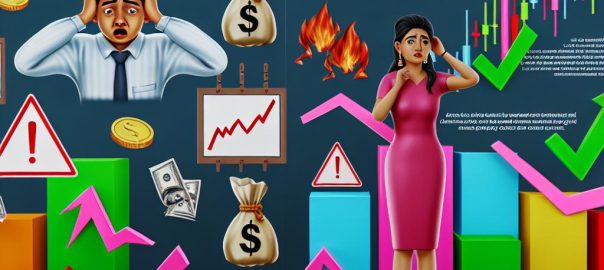Understanding Common Forex Trading Mistakes
Forex trading, while a popular investment method, requires navigating a complex market environment. It is unlike any other market, with its unique characteristics and dynamics that present both opportunities and risks. Currency values can fluctuate in seconds, influenced by a multitude of factors ranging from geopolitical events to economic indicators. Many traders, especially beginners, frequently make certain mistakes as they venture into this intricate and often unpredictable domain. Recognizing these pitfalls is the first step in avoiding them and ensure a more disciplined and informed trading approach. This article explores common errors in Forex trading and offers guidance on how to sidestep them effectively.
Lack of Proper Research
In the world of Forex trading, knowledge truly equates to power. Forex markets can be unpredictable, and it is crucial for traders to be well-informed before diving into trading activities. A lack of thorough research often leads to impulse decisions, opening positions based on hunches or inadequate data, which can result in substantial losses. Too often, traders may rely on outdated information or follow herd behavior without verifying the credibility of the underlying data.
How to Avoid: Utilize reputable sources for market analysis and other resources that offer deep dives into global macroeconomic events. It is beneficial to stay updated on financial news, incorporating them into your trading strategy. Consider subscribing to financial news platforms that offer reliable insights into market trends. Doing so not only supports more informed decision-making but also aids in anticipating potential market shifts.
Ineffective Risk Management
Ineffective risk management remains a prominent reason behind many traders’ losses. When positions are not protected by effective strategies, adverse market movements can quickly result in significant financial setbacks. The tendency to overlook the importance of managing risk effectively leaves traders vulnerable to volatile currency movements.
How to Avoid: Implement strategies such as setting stop-loss orders to automatically close a position when it reaches a certain level of loss. Additionally, always calculate the potential risk-to-reward ratio for each trade to ensure that the potential rewards justify the risks. Employ the tools offered by trading platforms designed to support risk management efforts, offering added protection to your investments.
Over-Leveraging
Leverage is a double-edged sword in Forex trading. Many Forex brokers offer high leverage, which, while increasing potential profits, can also amplify potential losses. Traders who over-leverage their investments often face hefty losses when trades do not go as planned. It becomes overwhelmingly challenging to recover from losses when they are multiplied by high leverage, threatening the long-term sustainability of one’s trading ventures.
How to Avoid: Discipline in leverage usage is crucial. Start with lower leverage ratios to minimize potential risks and avoid the temptation to overextend positions. Gradually increase your leverage as you gain confidence and accumulate experience in the trading environment. Doing so allows for improved risk management while harnessing leverage strategically.
Ignoring Trading Plans
Strategic planning is foundational to successful trading. A trading plan serves as a roadmap for traders, detailing strategies for entry and exit points, acceptable risk levels, and other crucial elements. Ignoring or abandoning such a plan leads to inconsistency and emotional decision-making that could significantly steer traders off course.
How to Avoid: Develop a detailed trading plan before you start trading. Outline specific goals, strategies, and guidelines that align with your risk tolerance and trading objectives. Consistently review and adjust the plan according to market conditions and individual performance, ensuring that adaptations are made based on informed insights. Diligently stick to your plan for more consistent and optimized trading results.
Lack of Emotional Control
Trading psychology is a significant component of successful trading in the Forex market. Emotional responses such as greed, fear, and impatience can cloud judgment, often resulting in unfavorable trade decisions. Allowing emotions to drive trading activities can lead to hastily executed trades that deviate from one’s strategic plan.
How to Avoid: Cultivating patience and discipline is a vital practice. Engaging in trading simulations with a demo account allows traders to develop emotional control without the pressure of real financial stakes. There are various resources available that offer strategies for managing emotions effectively in the trading context, supporting the development of a disciplined trading mindset.
Neglecting to Learn Continuously
The Forex market is ever-evolving, with complexities that call for continuous adaptation and learning. Traders who do not keep up with new techniques and market dynamics miss opportunities for increased profitability. Remaining stagnant in one’s trading approach can result in missing out on emerging strategies that could enhance trading effectiveness.
How to Avoid: Engage with ongoing education through resources such as courses, webinars, and online forums. This continual learning approach helps traders refine their techniques and stay abreast of changes in market scenarios. Embracing a culture of lifelong learning allows traders to stay competitive and informed of best practices in the industry.
Conclusion
Successful Forex trading requires a keen awareness of common pitfalls and the discipline to avoid them. It necessitates a comprehensive approach that goes beyond mere technical analysis. By conducting thorough research, applying sound risk management principles, using leverage wisely, adhering to a clearly defined trading plan, managing emotions effectively, and committing to continuous education, traders can significantly improve their chances of success in the Forex market. This comprehensive attunement not only enhances trading performance but fortifies traders’ confidence in navigating one of the most dynamic and challenging financial markets.
This article was last updated on: April 23, 2025

